The metaverse is set to play an important role in the next phase of our global digital evolution. As emerging technologies and both the technological and conceptual innovation of digital platforms (including the blurring of “virtual” and “physical” environments) continue to evolve, they will combine with ongoing social and behavioural change to expand how and where we choose to engage with one another.
Globally the appetite for this shift is strong for both businesses and consumers. In a recent metaverse survey: 66% of business executives in the US say that their companies are actively engaged with the metaverse, while 82% expect it to be part of “business as usual” within three years or less.
As healthcare continues evolving, so does the way we deliver and receive treatment and care. The metaverse has the potential to revolutionise healthcare, providing a virtual environment that transcends the limitations of traditional physical institutions. Leading GCC healthcare professionals are already exploring metaverse use cases, using tools such as 3D models of a patient’s body to help surgeons plan and conduct operations and how VR environments can be used for psychiatric therapy.
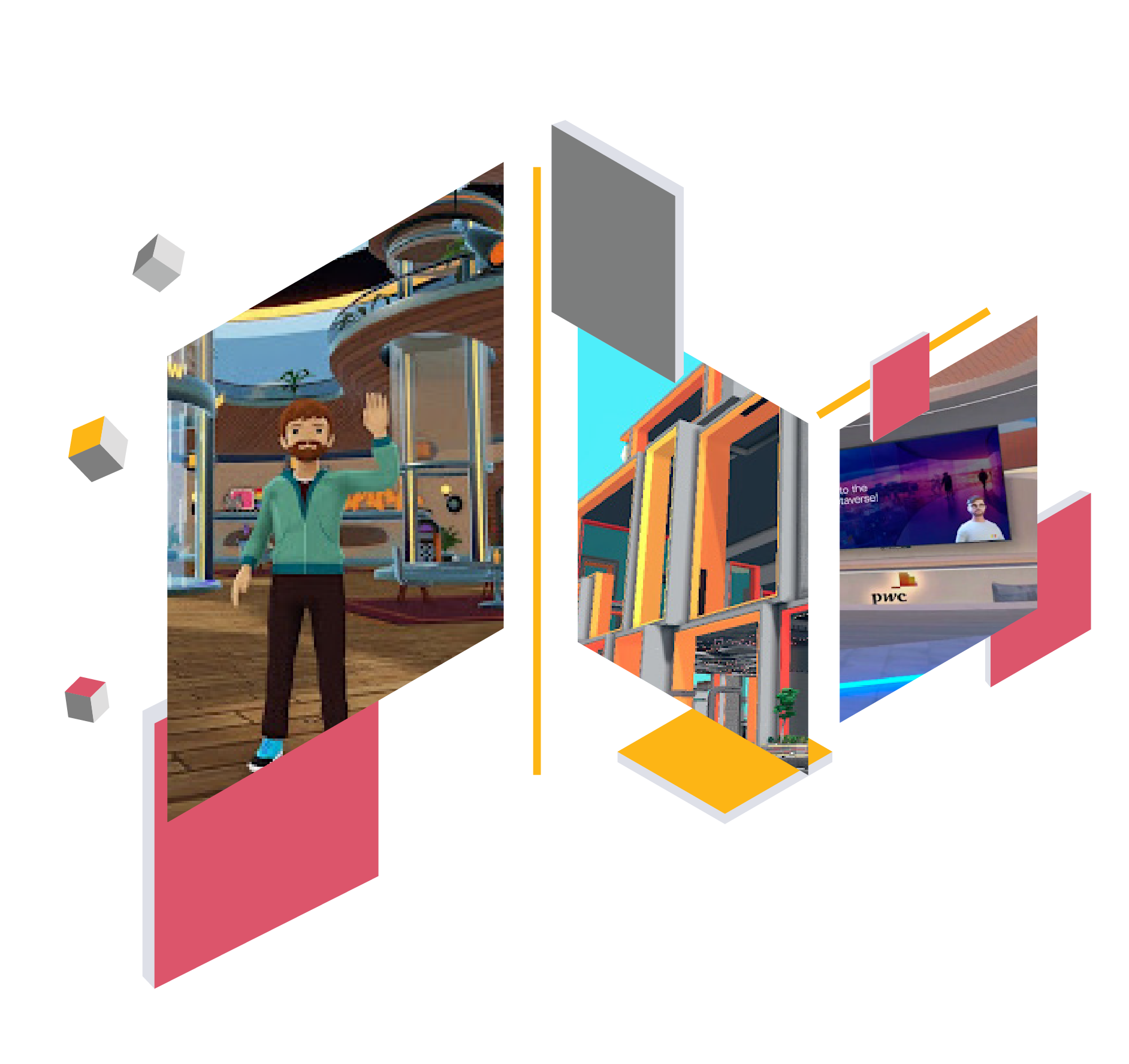
The Middle East is a “moon shot” region and a cradle of innovation, and is well-positioned to leverage the potential of the metaverse to improve healthcare. For a start, many GCC citizens, like patients worldwide, are now familiar with remote, online healthcare as an alternative to face-to-face consultations due to the global health crisis restrictions. Coming out of the global health crisis, improved health and wellness for all citizens have been further escalated as priorities in national transformation programmes, such as Saudi Arabia’s Health Sector Transformation Programme under Vision 2030. Meanwhile, investment in emerging technologies such as AI is pouring into the region, as it paves the way for the rise of its digital economy.
In the UAE, the Department of Health – Abu Dhabi (DoH) launched the Abu Dhabi Life Science Hub in the metaverse during Arab Health 2023, strengthening the emirate’s positioning as a life science hub. With this, the emirate aims to recreate and boost its life science ecosystem in the metaverse by connecting entrepreneurs, investors, and healthcare providers to exchange knowledge and experiences in a virtual setting. In the future, the Metaverse Life Sciences Hub will enable visitors to access consultations and a variety of healthcare services from the comfort of their homes, thereby boosting medical tourism in the country.
Besides Abu Dhabi, Dubai recently inaugurated its first hospital in the metaverse, launched by healthcare provider Medcare. As a digital twin of the physical hospital, it allows patients to experience its services before travelling to the physical space, including consulting with their doctors in VR. And last year, the Emirates Health Service (EHS) became the first healthcare authority in the world to launch the world's first Healthcare Metaverse platform – MetaHealth , while the Thumbay group announced that a metaverse hospital was in the works where the patients can visit using their avatars.
The Kingdom of Saudi Arabia has also been making huge strides in virtual health. For example, it recently launched Seha Virtual Hospital which supports 170 hospitals around the Kingdom. NEOM is also at the forefront of the metaverse evolution, and its flagship healthcare system will be underpinned by the latest in state-of-the-art digital innovation and emerging technology, including the metaverse. In fact by 2030, half of the economic contribution of the metaverse to GCC economies - or $7.6 bn - is expected to come from the Kingdom alone.
Yet in the GCC region, as is the case worldwide, the speed with which metaverse healthcare applications are coming onstream increases the need for a more informed debate about the potential benefits and risks. As the region looks ahead to Healthcare 4.0, we have conducted research into the current awareness, readiness, levels of trust and expected impact that the metaverse will have on healthcare delivery in the future.
Our first survey drills into the knowledge and experience of healthcare policymakers and professionals across the GCC, ranging from senior government officials to doctors and hospital managers. The second survey covers the expectations and concerns of GCC patients about healthcare delivery through the metaverse in the future.
Most respondents to both surveys are excited about the metaverse’s potential to improve delivery and treatment. Yet despite their enthusiasm, the surveys reveal the following key findings which require urgent action to make the most of this opportunity:

Healthcare in the metaverse is less mature than some other consumer industries, and patients have a knowledge-gap regarding its application and benefits

Most GCC healthcare professionals and patients lack expertise in how to use metaverse-related technologies in everyday practice


Development of metaverse healthcare is hindered by regulatory uncertainty and data privacy concerns
Are Middle East healthcare organisations and patients ready for the metaverse?
When it comes to awareness, healthcare professionals are significantly more likely to be familiar with the metaverse than their patients, with 45% having a good or expert understanding (vs 17% of patients). Conversely, 34% of patients have never heard of the metaverse, vs 2% of healthcare professionals.
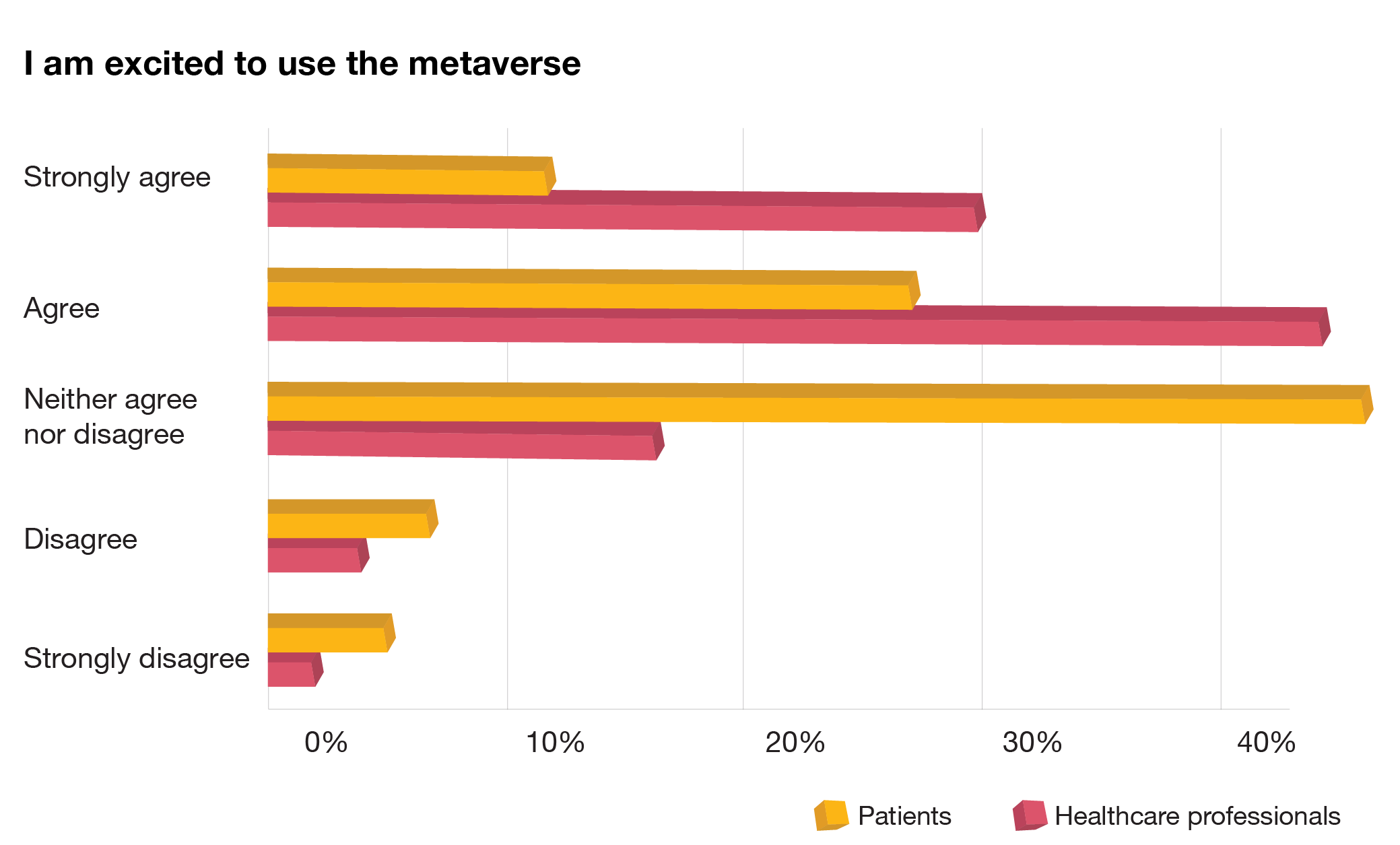
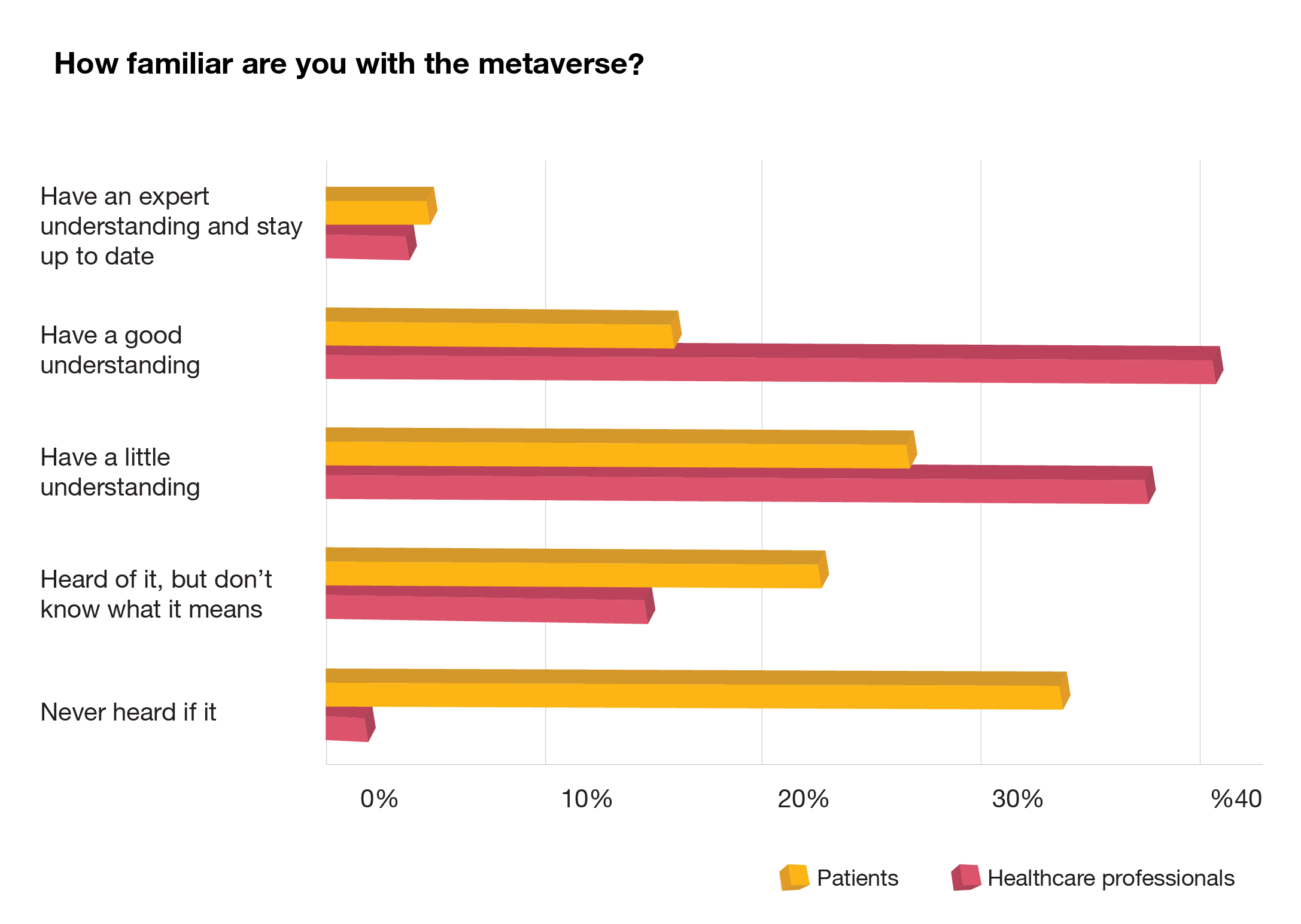
As well as having a greater understanding of the metaverse, healthcare professionals are also more excited to use the metaverse - with 77% keen to use it vs 40% of patients. 48% of patients answered “neither agree nor disagree”- given that the metaverse is less understood amongst patients, and that only 10% have ever received healthcare which deployed metaverse-related tools and treatments, this level of indifference towards the benefits of such a new concept is perhaps understandable.
“[The]metaverse will take time for adoption from a patient's point of view. It requires a gradual approach and a lot of educational sessions for existing practitioners.”
Perhaps unsurprisingly, the most popular emerging technology used by patients to date was “Virtual Reality” at 51%. And for those who had already experienced the metaverse, “gaming” (42%) followed by “education” (40%) were the most popular industries, where the use cases for this technology are more mature than in other industries. However, when asked about how they would like to use the metaverse in the future, “healthcare was ranked the second most popular area behind “education” - so the appetite is there if given the opportunity. This is consistent with the findings of a separate metaverse consumer survey, where “interact with health providers” was ranked the second most popular way to want to use the metaverse in the future. Additionally, 79% of patients expressed a preference for experiencing the metaverse either in a virtual interactive healthcare environment, human digital twin, or both.
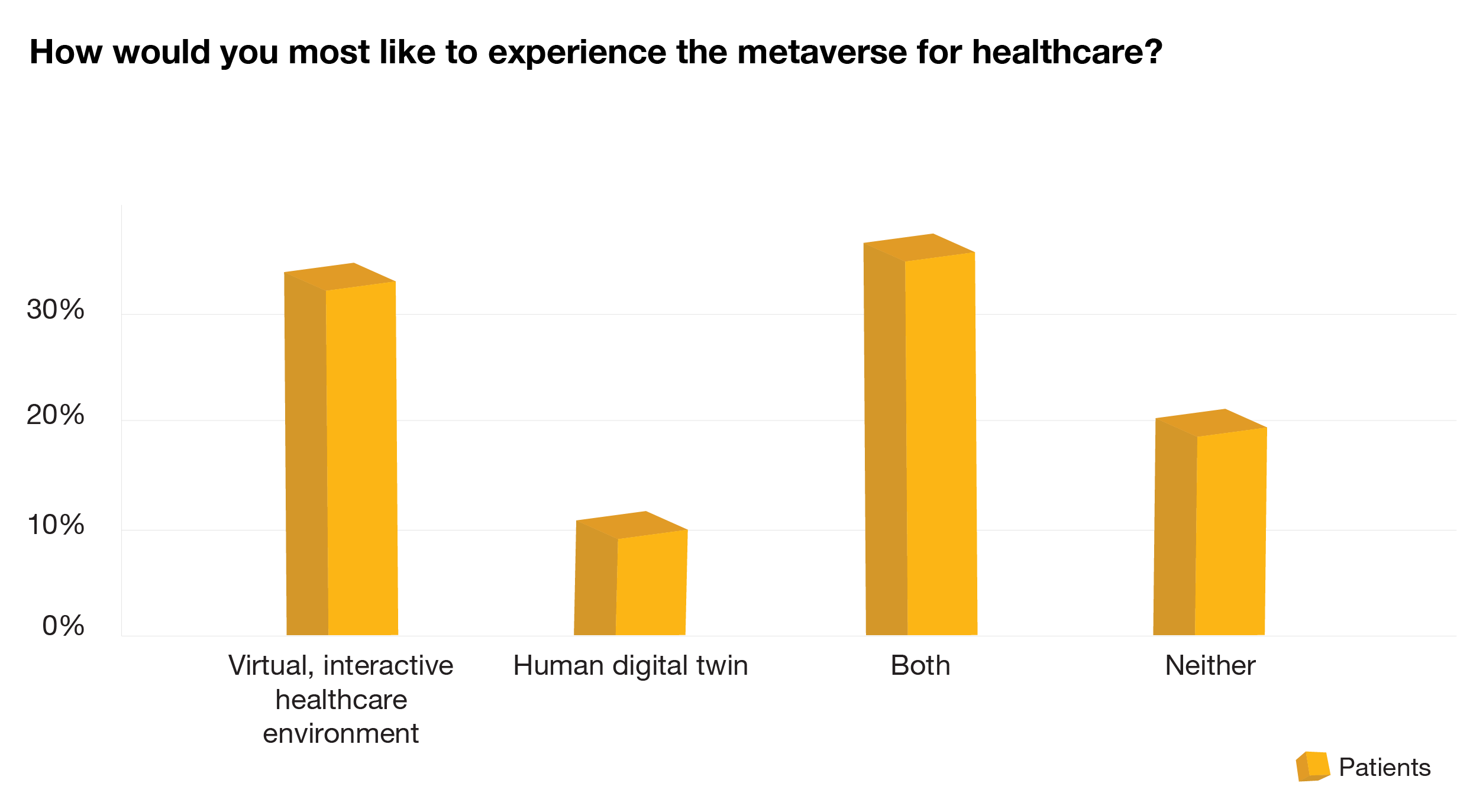
GCC healthcare policymakers are increasingly aware of the need to incorporate the metaverse into healthcare systems. For example, in February 2023, the UAE’s Ministry of Health and Prevention (MoHAP) announced launching a 3D Metaverse Healthcare Assessment Service using metaverse-related technology to evaluate healthcare professionals. In March, it was announced that the Ministry of Health and Prevention were to launch a Smart Digital Health regulatory framework making it mandatory for health providers to provide at least one virtual service by the end of 2023.
Healthcare professionals and policymakers face a more specific challenge regarding their own lack of knowledge about the metaverse. Although more familiar than their patients, there is still a learning gap that will need to be bridged to achieve a true and holistic healthcare transformation. Currently the top three emerging technologies used by healthcare providers are AI/Machine Learning (ML), VR and AR, and a key part of preparing for the metaverse - and Healthcare 4.0 in general - will involve upskilling in these and related technologies, alongside increased technical integration into the healthcare ecosystem and patient treatment processes.
The potential impact of the metaverse on healthcare in the Middle East
Against this favourable background, 83% of healthcare professionals and 60% of patients believe that the metaverse will have a positive impact on the patient experience.
For patients, the greatest perceived benefit to accessing healthcare in the metaverse was gaining “wider access to a range of healthcare providers, regardless of physical location”. Unconstrained by bricks, mortar and transport, patients will be able to shop around for the best expertise and right fit from a wider pool of potential clinicians and medical experts to meet their needs. This also opens up greater collaboration opportunities for medical professions for a more 360 degree overview of a patient's health. The second most cited patient benefit was “quicker access to healthcare advice and provision”.
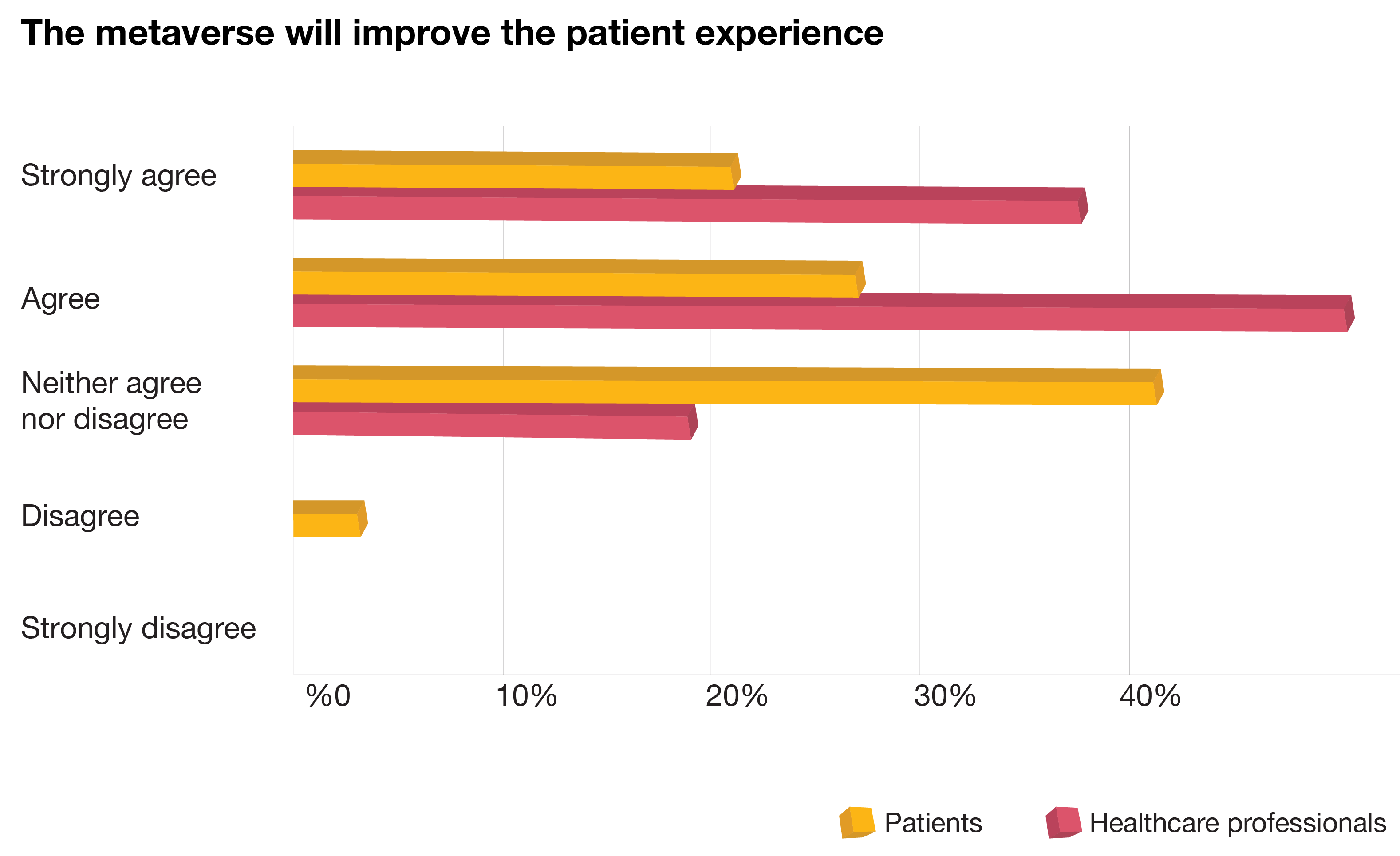
“Patients could interact with doctors and healthcare professionals, share medical information and receive diagnoses and treatments all from within the metaverse. This could greatly increase access to healthcare for people who live in remote or underserved areas, as well as for those who may have mobility issues that make it difficult to travel to appointments.”
From a healthcare professionals perspective, the metaverse is expected to have the greatest impact on improving the individual patient experience through “personalised medicine”.
Additionally, 87% believe that it will have a significant impact on care delivery itself, with most respondents ranking “virtual care/clinics”, “simulations and training” and “personalised medicine” in the top three ways it will have the greatest impact.
Indeed we are already seeing some of these improving care delivery today; the global health crisis super-charged the need for virtual care/ clinics globally, and huge strides have been made in areas such as mental health and psychosis treatment using digital therapeutics (DTx), such as gameChange by University of Oxford, We Are Alfred by Embodied Labs, and even Metaverse Treatment Rooms, such as those run by XRHealth. Other companies have also innovated with virtual care for specific illnesses, such as Floreo which teaches social, behavioural, communication and life skills for individuals with Autism Spectrum Disorder (ASD), ADHD, Anxiety and other neurodiverse conditions through a VR platform.
Simulation and training is another key area of development in the medical field, where VR has been shown to be effective. In a study run by the UK’s National Health Service, it was found that 92% of VR participants trained in infection-control measures gained an adequate understanding, compared to only 16% of the control group who received more traditional training. And during the global health crisis, medical specialists in the UK used AR technologies to manage global health crisis patients, reducing the global health crisis exposure of health staff by 51.5%.
Further innovations have since been made by first-movers such as UConn Health and Oculus, which provides interactive VR experience for orthopaedic surgical training, and We Are Alfred, by Embodied Labs, which provides an interactive and immersive education experience between the doctor and patient. Embodied Labs have also created an award-winning AR/VR technology application to change the way students can learn about diseases by allowing the user to experience how patients experience daily life. We believe these experiences will quickly become a more standard and expected method of patient care provision.
“While it is still early days for the Metaverse, it is clear that it has the potential to transform the healthcare industry in ways we can only begin to imagine.”
Building trust and security in metaverse healthcare environments – a shared challenge for Middle East healthcare professionals, patients and regulators
Trust lies at the heart of the patient-doctor relationship. In this regard, the two surveys highlight how much work still needs to be done to reassure GCC citizens that the metaverse will be a safe and secure virtual healthcare space.
60% of healthcare professionals and 55% of patients said that they would be comfortable using an avatar to engage with their doctor/patient in the metaverse.

However, 42% of patients cited data privacy concerns as the greatest barrier to using the metaverse to access healthcare, a far higher proportion than other potential obstacles such as “personal access to technology” (18%) or “lack of digital skills” (12%).
The challenge for GCC healthcare policymakers and professionals, shared with their global counterparts, is how to address and resolve these reasonable anxieties about whether metaverse healthcare is securely private and confidential. An encouraging starting point is that a substantial proportion (58%) of patients would be willing to share their medical history and information in the metaverse with a verified medical enterprise.
It is also worth bearing in mind that the rising Middle East generation of Millennials and Gen Z, who are poised to benefit from metaverse healthcare, are “digital natives” who are more at home with advanced technologies. Yet their sophistication increases the onus on healthcare policymakers, regulators and providers to ensure that metaverse healthcare in all its forms meets the highest possible technical standards regarding data security. Also, that digital healthcare provision (such as DTX) can be regulated as closely as traditional healthcare.
In recent years, GCC governments have responded to advances in digital medicine with new regulations designed to protect the interests of the patient; one example among many is Abu Dhabi’s Healthcare Information and Cyber Security Standard, introduced in 2019. The difficulty presented by metaverse healthcare is the sheer speed of advances in the relevant technologies, such as VR and AR, and the resulting applications across the healthcare spectrum, from hospital management and clinical diagnostics to surgical operations and outpatient treatments and therapies.
Healthcare professionals are well aware of this issue. Most of them say they currently use or plan to use AR and VR technologies in their healthcare organisations, as well as AI and machine learning healthcare tools. Yet overall, these expert respondents are unsure whether Middle East healthcare regulators are ready for the metaverse, while regulatory uncertainty and worries about data privacy and cybersecurity are seen as significant barriers to implementing metaverse-related technologies and treatments.
None of these barriers are insurmountable, and GCC healthcare regulators should also be aware that the metaverse has the potential to improve patient security. For example, blockchain technologies in the metaverse can be used to lock up patient data more securely compared with centralised healthcare databases.


Looking ahead
GCC healthcare professionals need to prepare for the metaverse, and ensure their patients are ready as well
Amid massive investments by GCC countries in new digital technologies and infrastructure, almost all (84%) healthcare professionals believe that the metaverse will transform the region’s future healthcare ecosystem. Meanwhile, 58% of patients would like to access their healthcare either as virtually as possible or in a hybrid model.

“[The metaverse] is amazing and I can’t wait for the future…we should continue to educate everyone in order to make this a reality. Only when a whole lot of people have managed to understand and accept an idea does it ever become a worldwide possibility”.
It’s clear that both patients and professionals in the Middle East see a great deal of potential in the metaverse as a part of the overall treatment landscape. Most healthcare professionals say they are already embedding metaverse-related technologies in their healthcare activities or planning to do so within the next two to three years.
The future of Healthcare in the metaverse is firmly on the horizon - and a horizon that is getting ever closer. Enthusiasm is high and the expected impacts on patient care delivery and the patient experience are very positive. Policy change and recent healthcare innovations within the region are heading in the right direction to pave the way for this new frontier and ultimately benefit from the first-mover advantage. Yet some knowledge gaps and questions on data privacy and regulatory uncertainty still need to be addressed, alongside logistics around upskilling, funding, building the technological infrastructure and integrating it within existing healthcare ecosystems.

What next?
Key recommendations
In order to prepare for this new frontier, it is vital to:
Getting involved starts by getting educated as a first step, allowing you to understand what the metaverse can and cannot offer you given the context and background of your business. We suggest creating a small task-force that can start to explore use cases and champion the concept within your organisation. Invest in programmes for creating awareness and opportunities for stakeholders to try out key technologies underpinning the metaverse. Engaging key stakeholders (healthcare providers/ clinicians, researchers and regulators, and the patient population) early on is key. It would also be a great idea to initiate and/or join similar exploratory activities with other similar organisations. This will allow you to understand what others are thinking as well as ensure that you are at the forefront of shaping use cases and sharing your experience and perspective.
Create a clear benefits case leveraging lessons learned and existing case studies. Ensure there is a clear understanding of the desired outcomes, and how the use cases will add additional value and contribute towards the achievement of a target such as the Quadruple Aim. Align the physical and digital: plan on adding digital services or assets to the treatment option portfolio, with a consistent level of care. We suggest that the most important step in defining use cases is understanding your current and future needs that can be addressed by the metaverse. Since the concept itself is still evolving, be creative and not necessarily develop use cases that already exist. You can define your direction as a pioneer with use cases that not only solve some of your own challenges but potentially even those of many other similar organisations.
Start with a MVP before going for wider implementation. During this, embed trust with regulators, stakeholders and patients through risk mitigation strategies for cybersecurity, privacy and compliance. As healthcare is a highly regulated science, we really recommend putting your MVP through significant trial and testing to justify its effectiveness in addressing your relevant pain points, and engaging with regulators early on as well as research bodies to support ongoing development, research and knowledge. Particularly engage the potential sceptics amongst your stakeholders and ensure you get them to contribute to the advancement of your MVP. We also recommend you develop multiple iterations of your MVP as you advance its testing of effectiveness and viability.
Healthcare providers, clinicians and regulators need to start taking action today to lay the foundations for this latest frontier in healthtech, and ensure their place in the future of healthcare as it enters the metaverse.











